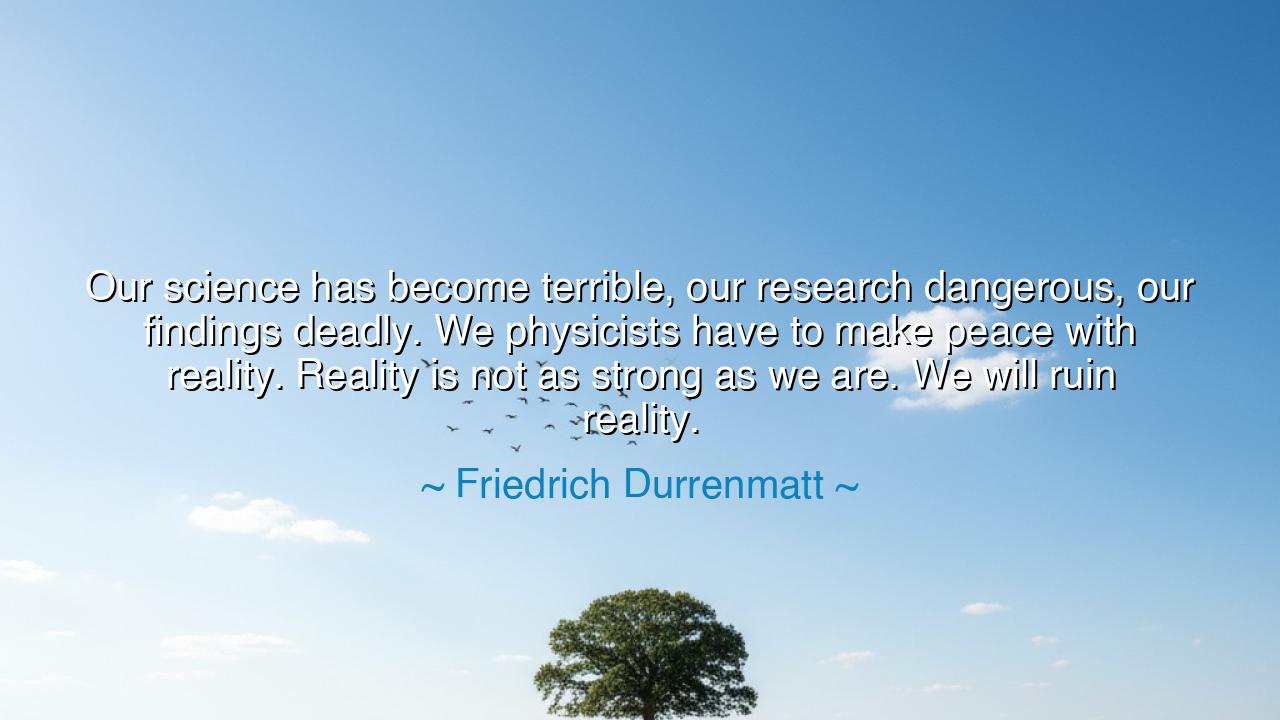
Our science has become terrible, our research dangerous, our
Our science has become terrible, our research dangerous, our findings deadly. We physicists have to make peace with reality. Reality is not as strong as we are. We will ruin reality.






"Our science has become terrible, our research dangerous, our findings deadly. We physicists have to make peace with reality. Reality is not as strong as we are. We will ruin reality." These words from the great Friedrich Dürrenmatt, spoken with the weight of a prophet in an age of wonder and dread, reverberate through the corridors of time. In them, he warns us, not of the science that elevates our understanding, but of the power we have to reshape the very world we hold dear. For, in the unbridled pursuit of knowledge, we have awakened forces that were never meant to be disturbed. Our research, once a light of hope, has become a dark force that threatens the fragile balance of the world itself.
It is with the solemnity of a king preparing for battle that Dürrenmatt speaks of this ominous shift. We, as a species, have dared to unravel the secrets of the universe—to peer into the very core of matter, to glimpse the vast mysteries that lay hidden from the beginning of time. In doing so, we have unlocked powers terrible in their magnitude, forces that could heal or destroy, bring life or death. The atom, once the subject of awe and curiosity, has become the very weapon that could unmake civilization. In this, Dürrenmatt sees the danger we have unleashed, the deadly findings we have set loose upon an unsuspecting world.
Let us turn to history, to the story of the Manhattan Project, where brilliant minds, driven by the noblest intentions, sought to unlock the very forces of nature in the service of their nation. The birth of the atomic bomb, born from the fervent toil of physicists such as J. Robert Oppenheimer and Enrico Fermi, was meant to end a war, to bring peace. But what was the outcome? The destruction of entire cities, the devastation of Hiroshima and Nagasaki, and the haunting question that would follow humanity for generations: have we, in our thirst for knowledge, destroyed more than we ever intended? The power we wielded—born of our intellectual prowess—was far beyond our ability to control. The world had been changed forever, and it was a change that brought with it the shadow of destruction.
And so, Dürrenmatt’s cry rings with the urgency of a prophet warning his people of a great calamity. Science, once the light that illuminated the path of progress, has become the beast we cannot tame. Our research, instead of bringing harmony, has become a tool of division, a force capable of great good or great evil. Physicists, those who once sought to understand the nature of reality, must now face the terrifying truth: they have not simply unlocked the door to knowledge, they have opened a chasm that threatens to swallow everything.
In his words, Dürrenmatt calls us to face reality—the reality that we are not gods, that we are mere mortals capable of great error. Our creations, though born of our finest minds, are beyond our comprehension. We have delved into the very fabric of the universe, altered the course of nature, and set into motion forces that we no longer fully understand. And in this, we have become like Icarus, flying too close to the sun, unaware that our wings may soon melt. We must make peace with the reality that our power has outstripped our wisdom. Reality, as Dürrenmatt warns, is not as strong as we are, but it is more subtle, more resilient, and in its own way, more unforgiving.
What then shall we do, knowing the peril we face? The lesson lies in the balance between the pursuit of knowledge and the wisdom to wield it. In the age of technology, we must remember that with every new discovery, we must ask ourselves: what price do we pay for this knowledge? We must cultivate humility alongside our intellectual pursuits. We must temper our curiosity with the understanding that not all things are meant to be understood, not all knowledge is meant to be wielded. It is not enough to create; we must also have the wisdom to protect, to safeguard what is fragile and sacred.
And so, as we stand at the crossroads of knowledge and power, we must heed the lessons of the past. Let the words of Dürrenmatt remind us of our duty to the world we live in. In our quest to conquer the unknown, let us never forget the reality that we are part of this world, not above it. In every discovery, let us ask: How does this serve the greater good? How does this honor the delicate balance of nature? We must, like the wise guardians of old, learn to make peace with reality, for in doing so, we preserve the fragile beauty of existence.
In our own lives, let us take this lesson to heart: to balance the thirst for knowledge with the humility of responsibility. Let us approach our work, our discoveries, and our creations with the awareness that we are but stewards of a world far greater than ourselves. And when we, as individuals, wield power—whether in the form of knowledge, influence, or technology—let us wield it with wisdom, with a deep respect for the reality that we must not destroy. For, in the end, it is not the force we command that defines us, but the wisdom with which we choose to use it.






AAdministratorAdministrator
Welcome, honored guests. Please leave a comment, we will respond soon